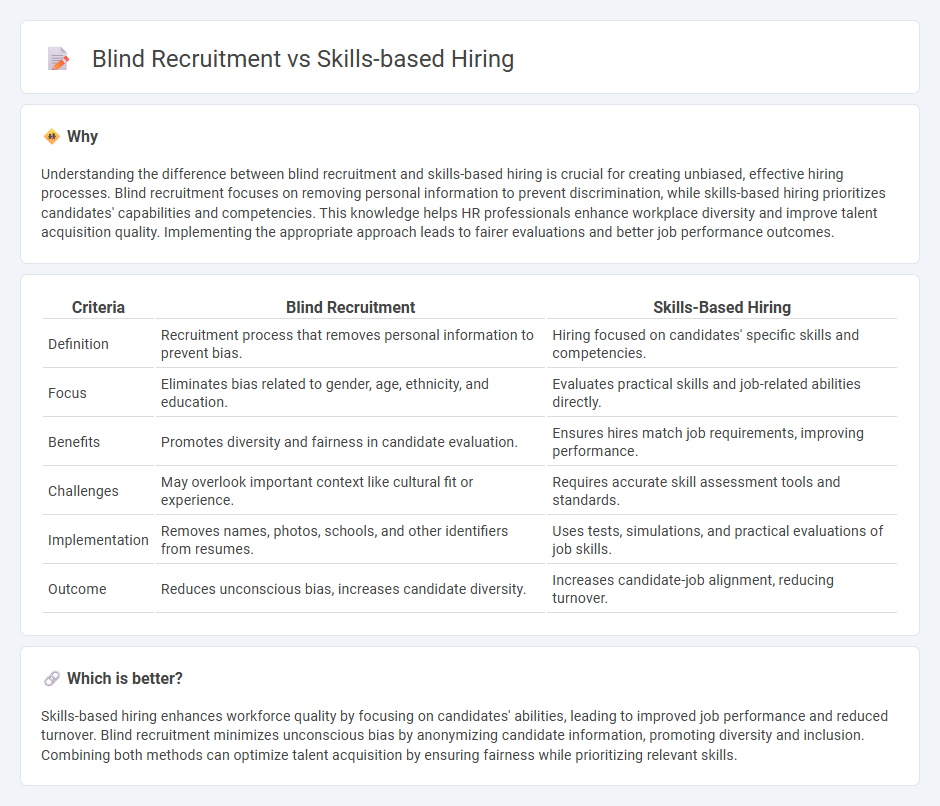
Blind recruitment improves diversity by removing personal information such as names and demographic details, focusing solely on candidates' qualifications to reduce unconscious bias. Skills-based hiring emphasizes evaluating applicants based on practical abilities, certifications, and job-relevant skills rather than traditional resumes or educational background. Discover how adopting these methods can transform your talent acquisition strategy and promote fair hiring practices.
Why it is important
Understanding the difference between blind recruitment and skills-based hiring is crucial for creating unbiased, effective hiring processes. Blind recruitment focuses on removing personal information to prevent discrimination, while skills-based hiring prioritizes candidates' capabilities and competencies. This knowledge helps HR professionals enhance workplace diversity and improve talent acquisition quality. Implementing the appropriate approach leads to fairer evaluations and better job performance outcomes.
Comparison Table
| Criteria | Blind Recruitment | Skills-Based Hiring |
|---|---|---|
| Definition | Recruitment process that removes personal information to prevent bias. | Hiring focused on candidates' specific skills and competencies. |
| Focus | Eliminates bias related to gender, age, ethnicity, and education. | Evaluates practical skills and job-related abilities directly. |
| Benefits | Promotes diversity and fairness in candidate evaluation. | Ensures hires match job requirements, improving performance. |
| Challenges | May overlook important context like cultural fit or experience. | Requires accurate skill assessment tools and standards. |
| Implementation | Removes names, photos, schools, and other identifiers from resumes. | Uses tests, simulations, and practical evaluations of job skills. |
| Outcome | Reduces unconscious bias, increases candidate diversity. | Increases candidate-job alignment, reducing turnover. |
Which is better?
Skills-based hiring enhances workforce quality by focusing on candidates' abilities, leading to improved job performance and reduced turnover. Blind recruitment minimizes unconscious bias by anonymizing candidate information, promoting diversity and inclusion. Combining both methods can optimize talent acquisition by ensuring fairness while prioritizing relevant skills.
Connection
Blind recruitment eliminates bias by removing personal information such as name, gender, and age from applications, focusing solely on candidates' skills and qualifications. Skills-based hiring evaluates applicants based on their competencies and relevant abilities, ensuring a meritocratic selection process. Together, these approaches promote diversity and inclusion by prioritizing talent and potential over demographic factors in human resources.
Key Terms
Competency Assessment
Skills-based hiring emphasizes evaluating candidates' competency assessments through practical tests and job-specific simulations to ensure alignment with role requirements. Blind recruitment removes personal identifiers to reduce bias, yet still relies on competency assessments to objectively measure candidates' abilities. Discover how combining competency assessments with unbiased recruitment strategies can enhance talent acquisition effectiveness.
Unconscious Bias
Skills-based hiring prioritizes candidates' abilities and experience, reducing the impact of Unconscious Bias by emphasizing measurable competencies over demographic factors. Blind recruitment further mitigates bias by anonymizing applications, stripping identifiable information such as names and genders. Explore how integrating both methods can optimize diversity and inclusion in recruitment practices.
Job Matching
Skills-based hiring prioritizes candidates' abilities and competencies relevant to job requirements, enhancing precise job matching and reducing reliance on traditional credentials. Blind recruitment removes identifiable information to minimize unconscious bias, but may overlook nuanced skill assessments crucial for optimal job alignment. Explore further how these methods impact effective talent acquisition and organizational success.
Source and External Links
Skills-based hiring - Wikipedia - Skills-based hiring is the practice where employers specify required skills or competencies, allowing applicants to demonstrate their abilities independently of academic degrees, often through third-party testing to match job-specific skill levels set by employers.
Skills-Based Hiring: Why It's Time to Rethink Hiring - Radancy Blog - Skills-based hiring prioritizes candidates' actual abilities over traditional credentials, expanding talent pools and diversity, with adoption rising from 57% in 2022 to 81% in 2024, though many organizations still face challenges in fully implementing this shift.
Why Skills-Based Hiring Is so Revolutionary - Workday Blog - This approach emphasizes assessing candidates' hard and soft skills rather than degrees or past titles, addressing workforce gaps and increasing candidate diversity, with over half of 2024 US job postings excluding formal education requirements.
 dowidth.com
dowidth.com